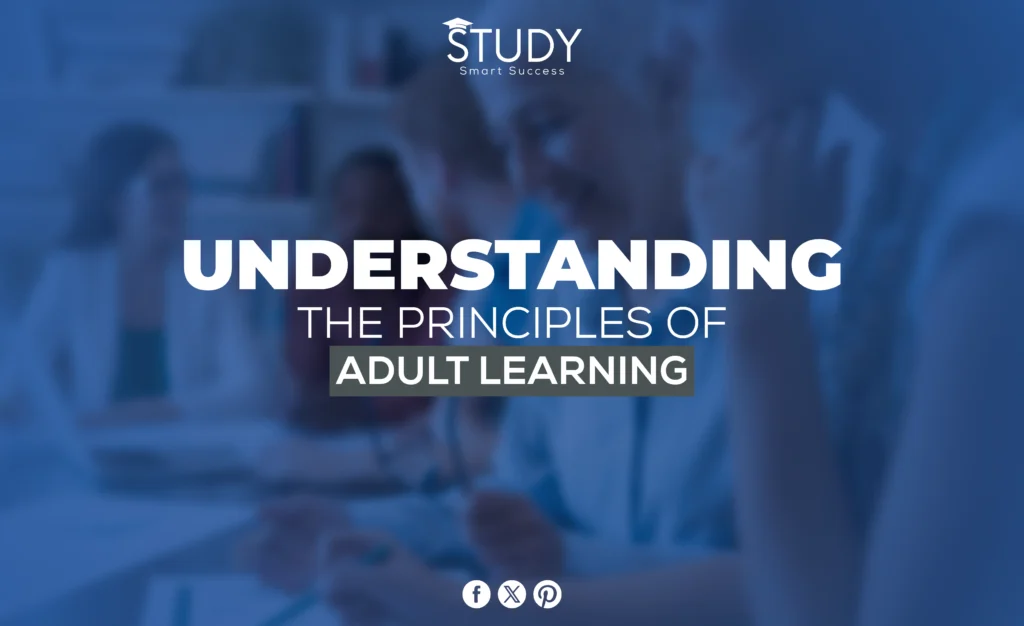Introduction to Adult Learning
Adult learning, also called andragogy, is how adults pick up skills, attitudes, and knowledge during their lives. Adults, as opposed to children, approach learning with many experiences and responsibilities, significantly impacting how they use new knowledge. It is essential for educators, trainers, and anyone else engaged in supporting adult learning experiences to understand the fundamentals of adult learning. This article will examine and understand the Principles of Adult Learning in depth.
What Elements are Included in Information Literacy? This article helps you learn more about information literacy.
Core Principles of Adult Learning
The idea of self-direction is one of the cornerstones of adult education. Adults would instead learn on their initiative rather than passively absorbing knowledge. Their ability to integrate new information with their prior experiences is made possible by their autonomy, which increases the significance and effect of learning.
Furthermore, the learning content’s relevancy is quite essential. When adults can immediately understand how their knowledge and abilities will improve their personal or professional lives, that information and skill will inspire them to study more. This hands-on method of instruction emphasizes how crucial it is to create learning exercises that directly apply to actual situations.
Adults also gain from learning via problem-solving techniques since these methods expose them to real-world situations that call for the application of newly acquired information. This approach improves learning and fosters analytical and critical thinking abilities. And last, a vital component of the adult learning environment is respect. Adult learners offer a wealth of experiences and information. Therefore, it is essential to recognize and treat their contributions equally to create an environment favorable to learning and promote participation and idea sharing.
Andragogy vs. Pedagogy
Malcolm Knowles invented the term “andragogy,” which stresses self-directed learning and acknowledges adults as active learners. Conversely, pedagogy—often used in early childhood education—assumes a more passive role for students and concentrates on teacher-directed teaching. Comprehending these differences is essential to customizing educational opportunities to adult learners’ unique requirements.
Self-Directed Learning
Self-directedness is one of the central tenets of adult learning. Adults like to be in charge of their education, establishing their objectives and choosing the direction and speed of their education. Self-directed learning may be assisted by facilitators who provide tools, direction, and chances for introspection.
Experience as a Learning Resource
The life experiences of adult learners serve as an invaluable resource for them throughout the learning process. Adding in learners’ experiences, whether related to professional skills, personal struggles, or cultural background, improves relevance and enriches the teaching process.
Relevance to Real-life Situations
Adults are more motivated to study when they can immediately apply new information to their everyday lives. By tying learning goals to actual circumstances, instructors may increase student engagement and guarantee that the material they have learned is lasting and relevant.
Creating an Inclusive Learning Environment
Establishing an inclusive learning environment that honors and celebrates learner variety is crucial to successfully supporting adult learning. This entails considering and meeting each participant’s unique demands, learning preferences, and histories. An inclusive approach dramatically raises motivation and engagement levels by fostering a sense of worth and understanding among all students.
It also entails offering various teaching approaches to accommodate learning preferences, including visual, auditory, kinesthetic, and reading/writing preferences. Teachers may build a vibrant and encouraging learning community that improves adult learners’ experiences by cultivating an atmosphere that values open communication and respect for one another.
Problem-Centered Approach
Environments that promote critical thinking and active problem-solving are ideal for adult learners. By presenting authentic problems and promoting cooperative solutions, instructors can develop students’ analytical abilities and self-assurance.
Motivation in Adult Learning
Adult learning is significantly influenced by motivation. Although incentives from outside sources might be inspiring, intrinsic motivation stemming from one’s passions and objectives is more enduring. By leveraging students’ interests and offering worthwhile learning opportunities, educators may foster motivation in their students.
Feedback and Reflective Learning
Another essential element in the process of adult learning is feedback. Giving constructive comments enables students to pinpoint their areas of strength and growth. It must be timely, relevant, and tailored to the manager’s objectives. The learning process is also greatly enhanced by cultivating a culture of reflective learning, in which adults reflect on what they have learned, how they have applied it, and its significance.
Journaling and group conversations are two reflective behaviors that may help learners solidify their knowledge and use it more successfully in their personal and professional lives.
Leveraging Technology in Adult Learning
Technology is essential to adult education in the digital era since it offers accessible and adaptable learning options. Learners may choose their study terms and pace using digital materials, virtual classrooms, and e-learning platforms. In addition, technology provides a wide range of multimedia material to suit different learning tastes and styles, including podcasts, interactive simulations, and movies. Educators must guarantee that technology augments the educational process without hindering or subtracting from the learning goals.
Empowering Learners for Lifelong Learning
Ultimately, adult learning aims to enable people to become lifelong learners rather than only imparting information or skills. This entails developing a curious, resilient, and adaptive attitude. By promoting a never-ending quest for information, educators may promote lifelong learning by applying what is learned in novel and varied situations and fostering the growth of self-regulated learning abilities.
Managing their learning process means being more equipped to handle future undertakings and problems, keeping them competitive and relevant in a changing world, except for Learner’s Autonomy.
Adult learners value independence and adaptability in their educational process. Understanding and addressing different learning styles enables students to interact with the content meaningfully, improving knowledge and retention in the long run.
Collaborative Learning
Collaborative projects and group activities foster peer learning and provide chances for knowledge exchange and social support. Teachers can create a dynamic learning environment that promotes active involvement and collaboration by cultivating a feeling of community and cooperation.
Feedback and Reflection
Adult learning requires both self-reflection and constructive criticism. While contemplation promotes metacognition and enhances comprehension, feedback directs learners’ growth and aids in identifying areas for improvement.
Continuous Learning
A dedication to ongoing development and progress defines adult learning as a lifetime activity. Adults who embrace change and actively seek out new experiences will be able to adapt and persevere in a constantly changing world.
Application in Professional Development
The concepts of adult education are especially pertinent regarding professional development. Organizations may promote a learning culture that improves employee performance and happiness by customizing training programs to the requirements and preferences of adult learners.
Challenges in Adult Learning
Adult learning has advantages but drawbacks, such as different degrees of previous knowledge, conflicting goals, and time limits. Individualized assistance and adaptable methods are needed to successfully address these challenges and fulfil the various requirements of learners.
Future Trends in Adult Education
The field of adult education is changing due to technological advancements, such as the possibility of individualized instruction and distance cooperation. Teachers’ methods must distance themselves as technology advances to make the most of these resources in student performance.
Integrating Emotional Intelligence in Adult Learning
Emotional intelligence is becoming more widely acknowledged in adult education because of its capacity to improve leadership, empathy, communication, and self-control. An emotionally intelligent learning environment creates a secure and welcoming place for development and exploration while assisting individuals in controlling their own emotions and recognizing those of others.
Teachers may include activities that foster self-awareness, emotional regulation, social awareness, and relationship management into their curricula to support the development of emotional intelligence. Engaging in such techniques helps with personal growth and improves teamwork and group dynamics, preparing students for emotional intelligence in personal and professional contexts.
Harnessing the Power of Networking and Mentorship
In the ecosystem of adult learning, networking and mentoring are essential because they provide students access to a larger pool of peers, professionals, and mentors. By establishing connections with persons in their respective fields of interest or study, educators can significantly enhance the educational experience by offering learners chances for development, real-world assistance, and insights.
In particular, mentoring may provide tailored guidance and assistance to help individuals better manage their study pathways and patterns. Educators and institutions must consider implementing networking events and mentoring programs that fit their adult learners’ interests and learning goals to foster a more active, supportive, and connected learning community.
Prioritizing Accessibility and Inclusion
Because of today’s increasingly varied culture, it is critical to ensure that adult learning options are inclusive and accessible. This is consciously eliminating obstacles like physical impairments, financial constraints, or language problems that can keep people from fully engaging in educational programs.
Teachers and academic institutions must use various tactics, such as financial assistance and scholarship programs, multilingual instruction, and accessible learning technology. Adult education programs may reach a larger audience and provide people from all walks of life with professional and personal growth opportunities through accessibility and inclusiveness.
Fostering a Culture of Innovation and Creativity
In adult learning contexts, fostering creativity and innovation may significantly improve engagement and results. Students feel more ownership and engagement in their education when they can think freely and investigate novel ideas. This method helps students develop their critical thinking and problem-solving abilities and prepares them for the ever-changing needs of the contemporary workforce, prioritizing originality and invention.
By integrating design thinking, project-based Educators may foster this atmosphere by bearing and interdisciplinary methods in their courses, educators may encourage this atmosphere in novel and surprising ways.
Adapting to the Future of Work
A workforce that is technically proficient, flexible, resilient, and open to lifelong learning is necessary for the future workplace. To adequately prepare students for the reality of a global, digital, and quickly evolving economy, adult education programs must adapt to these shifting requirements.
This entails giving students access to programs and courses in cutting-edge fields and technology, developing soft skills like communication, collaboration, and emotional intelligence, and arming them with the knowledge and resources they need to take charge of their careers. Adult learning institutions may guarantee their students are prepared to succeed in the rapidly evolving workplace by keeping up with employment trends and coordinating their curricula with future-ready skills.
Conclusion
In conclusion, developing successful and exciting educational experiences for adult learners requires an awareness of adult learning principles. Teachers may enable individuals to realize their full potential and accomplish their learning objectives by respecting their experiences, encouraging self-direction, and creating a supportive learning atmosphere.



